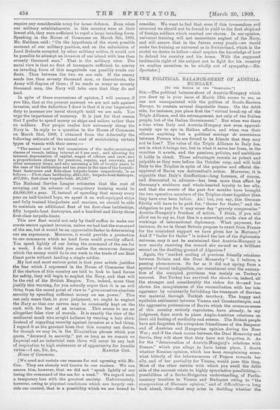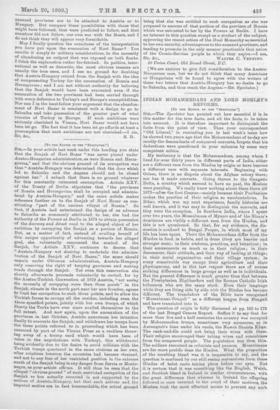THE POLITICAL BALANCE-SHEET OF AUSTRIA- HUNGARY.
[To TIIA EDITOR or TR R "SPECTATOR."] Sin,—The political balance-sheet of Austria-Hungary which you drew up in your issue of March 13th seems to me, as one not unacquainted with the politics of South-Eastern Europe, to contain several disputable items. On the debit side, for instance, you place first the " virtual break-up of the Triple Alliance, and the estrangement, not only of the Italian people, but of the Italian Government." But when was there a time when Italy and Austria-Hungary saw even approxi- mately eye to eye in Balkan affairs, and when was their alliance anything but a political mariage de convenance between Powers who are forced to be friends that they may not be foes ? The value of the Triple Alliance to Italy lie, not in what it brings her, but in what it saves her from, in the enmities it averts, and the passions, policies, and ambitions it holds in check. These advantages remain as potent and palpable as they were before the October coup, and will hold Italy to the Triplice in spite of the popular and official dis- approval of Baron von Aehrenthal's action. Moreover, it is arguable that Italy's disaffection—long foreseen, of course, and discounted in advance—has been more than offset by Germany's stubborn and whole-hearted loyalty to her ally, and that the events of the past few months have brought the two operative members of the Triplice closer together than they have ever been before. Ali! but, you say, this German fidelity will have to be paid for, " ths.ler for tinder," and the obligation to pay for it may some day "gravely compromise" Austria-Hungary's freedom of action. I think, if you will allow me to say so, that this is a somewhat crude view of the workings of international diplomacy. What payment, for instance, do we in Great Britain propose to exact from France for the consistent support we have given her in Morocco P And if " thaler for thaler " is indeed the law of the diplomatic universe, may it not be maintained that Austria-Hungary is now merely receiving the reward she earned as a brilliant second on the duelling-ground of Algeciras ?
Again, the "marked cooling of previous friendly relations between Britain and the Dual Monarchy" is, I believe, a passing phenomenon. So far as it did not spring from A species of moral indignation, our resentment over the annexa- tion of the occupied provinces was mainly on Turkey's account. But Turkey has survived the shock—is, indeed, all the stronger and considerably the richer for it—and has shown the completeness of the reconciliation with her late aggressor by voluntarily forbidding the transport of Serviau war material through Turkish territory. The happy and equitable settlement between Vienna and Constantinople, and the aggressive pretensions of Servia which the common-sense of this country entirely reprobates, have already, in my judgment, done much to place Anglo-Austrian relations on their old footing of cordiality and esteem. The British people have not forgotten the outspoken friendliness of the Emperor and of Austrian and Hungarian opinion during the Boer War ; and if the clash comes between the Dual Monarchy and Servia, they will show that they have not forgotten it. As for the "deterioration of Austria-Hungary's relations with
France," which you allege to have taken place, I doubt whether Russian opinion, which has been complaining some- what bitterly of the lukewarmness of France towards her ally, and of her partiality for Vienna, would pass this item. Most of the other entries with which you swell the debit
side of the account relate to highly speculative possibilities,—
possibilities of a Sorbo-Bulgarian understanding, of Parlia- mentary troubles in Vienna and Budapest owing to "the
exasperation of Slavonic opinion," and of difficulties—a long look ahead, this—that may arise in deciding whether the
annexed provinces are to be attached to Austria or to Hungary. But compare these possibilities with those that might have followed, that were predicted to follow, and that somehow did not follow, our own war with the Boers, and I do not think they will appear very formidable.
May I finally question the soundness of the interpretation you have put upon the evacuation of Novi Bazar ? You ascribe it Simply to military considerations, to the necessity of abandoning an outpost that was exposed on both flanks. I think the explanation rather far-fetched. In politics, inter- national as well as domestic, the most obvious reasons are usually the true ones, and I see no ground for doubting that Austria-Hungary retired from the Sanjak with the idea of compensating Turkey for the annexation of Bosnia and Herzegovina ; and I am not without authority for believing that the Sanjak would have been evacuated even if the annexation of the two provinces had been carried through with every deference to Turkey's and Europe's susceptibilities. Nor can I in the least follow your argument that the abandon- ment of Novi Bazar is consistent with a design to go to Salonika and take possession of the greater part of what remains of Turkey in Europe. If such ambitions were seriously cherished in Vienna, Novi Bazar would not have been let go. The fact that it has been let go affords at least a presumption that such ambitions are not cherished.—I am,











































 Previous page
Previous page